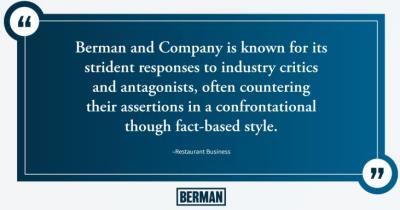“You can either Win Ugly or Lose Pretty” This statement by Richard Berman encapsulates his approach to defending the intensive livestock industry against activists. Rick recently retired from Berman and Company, a public relations and advocacy consultancy he established 35 years ago. He is a graduate of Transylvania University in Lexington, Kentucky and the law school at William and Mary. His professional activities first centered on aspects of labor law with Bethlehem Steel and the U. S. Chamber of Commerce. His work with the Pillsbury Company Restaurant Division in Texas brought  him into contact with sourcing of food and emerging welfare issues raised by activists. This led him to establish his consultancy and advocacy practice in Washington D. C. His firm represented a broad spectrum of the food industry including producers and retailers opposing the activities of PETA, HSUS and kindred organizations. EGG-NEWS recently had the opportunity to meet with Rick and explore his views.
him into contact with sourcing of food and emerging welfare issues raised by activists. This led him to establish his consultancy and advocacy practice in Washington D. C. His firm represented a broad spectrum of the food industry including producers and retailers opposing the activities of PETA, HSUS and kindred organizations. EGG-NEWS recently had the opportunity to meet with Rick and explore his views.
EGG-NEWS: What has motivated you to defend the livestock industry?
Rick Berman: I like the people and believe in helping them manage their issues. Consumers must have free choice over what they eat and should not be restricted by the opinions of an elite minority who have no license to superimpose their views on others.
EGG-NEWS: What has guided your approach to opposing activists’ organizations?
Rick Berman: I believe in offense. Public relations firms mainly deal with crisis management. That is defensive in nature. Crisis prevention is cheaper and more effective over the long term. Current industry issues involve the environment, animal welfare, labor relations and equity. These are known issues and there are others generally unknown over the horizon. Awareness of what is coming is most important. It is more effective to recognize a developing nuisance and preemptively respond before it becomes a problem. Clients of my firm agree to execute preemptive communications to defuse evolving industry challenges.

EGG-NEWS: How do you view the contribution of trade associations?
Rick Berman: Trade associations have very broad positive image agendas and usually respond to issues with information that appears in mainstream and social media. Activist attack campaigns are narrowly tailored on specific issues. They are more strategic with longer timelines than trade associations are structured to handle. Good issue management by industry is equally early and relentless to convince consumers of the merits of an issue while sharing a negative image of the opposition. Publicity that goes on for extended periods costs money and needs to be budgeted much like trade association dues. But it is still cheaper than losing a big policy issue.
EGG-NEWS: As a Washington insider, you deal with politicians responsible for legislation that can either be detrimental or supportive of the livestock industry. How do you interact with this constituency?
Rick Berman: Politicians have a wet finger in the wind and are constantly evaluating the strength of competing issues. It’s necessary to marshal facts and to suggest approaches to problems that will ultimately be beneficial to their status. But without a complementary public message campaign and possible polling a politician may not be assured of constituency support for a vote.
EGG-NEWS: How best to respond to activist organizations that detract from the livestock industry?
Rick Berman: I said earlier it is critically important to go on offense. That allows an opportunity for an early framing or reframing of the debate. Secondly, activist organizations all have vulnerabilities. Diminishing their credibility is an appropriate and effective strategy. It is what they do when attacking a company or industry. Good opposition research on organization leaders, background, what they say in private meetings to supporters, and how they manage donations are just a few examples where their credibility and judgement can be attacked. These actions are typically beyond the appetite of trade associations that are focused on presenting a positive image of their industry. There is often a diversity of interests and attitudes on direction among board members of trade associations over how to deploy limited member dues. This is why our firm generally represents coalitions of leaders in an industry who have a common denominator attitude and bias for offense. Our activities complement the association interests.
EGG-NEWS: Now that you have retired from the company you established, what do you intend to do?
Rick Berman: I will continue to work with specific clients on issues I enjoy and where I have a personal relationship. My professional work will continue with my new organization and website www.RBB Strategies.com. I have also begun a new service for evaluating veteran charities. The RAM Veteran’s Foundation has a website <Charitiesforvets.org> that reviews 50 organizations that are effective and efficient in delivering services to veterans. We have also reviewed 50 veterans’ support charities that are wasting money and abusing donor intent. We are concerned those 50 “Not Recommended” organizations collect over one billion dollars annually.
EGG-NEWS: Do you have any message for the livestock and poultry industries?
Rick Berman: Don’t apologize for what you’ve been accused of. Often those are narrow issues made to seem like industry practices. Respond early. Don’t allow your opposition to frame the debate. And give the public a clear understanding of your opponent’s warts.
EGG-NEWS: Thank you, Rick.